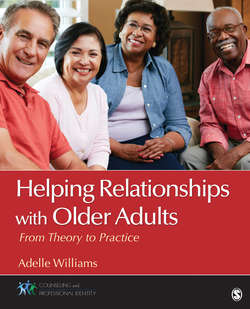Читать книгу Helping Relationships With Older Adults - Adelle M. Williams - Страница 82
На сайте Литреса книга снята с продажи.
Intimacy
ОглавлениеOlder people desire and continue intimate relations, and they embrace the need for love, partnership, and physical intimacy (Aleman, 2005; Connidis, 2006). Sex, like love, is an important component of a close emotional relationship in old age (Connidis, 2006; Gott & Hinchliff, 2004; National Council on Aging, 2002). Most people with sexual partners consider sex at least somewhat important. Only those who face insurmountable barriers to sex, such as poor health, place no importance on it (Gott & Hinchliff, 2004).
Nearly half of all Americans over the age of 60 have sexual relations at least once a month, and 40% would like to do so more often (Cutler, 2001). Sexual relations taper off with age, with 71% of men and 51% of women in their 60s having sex once a month or more and 27% of men and 18% of women in their 80s saying they do (Cutler & NCOA, 2001). Those who had sex at least once a month said it was important to their relationship. Women had sex less often in part because they are more likely to be widowed.
Thirty-nine percent of people surveyed stated that they are happy with the amount of sexual relations they currently have—even if it is none—while another 39% would like to do so more often (Cutler & NCOA, 2001). Only 4% of people said that they would like to have sexual relations less frequently. The survey also found that 74% of men and 70% of women find their sex lives more emotionally satisfying now that they are older than when they were in their 40s. As to whether it is physically better, 43% say it is just as good, or better, than in their youth, while 43% say sex is less satisfying. When it comes to knowledge about sex, older people are not necessarily wiser than their children. A third of the respondents believed it was natural to lose interest in sex as they aged (Cutler & NCOA, 2001).
Psychosocial factors have been identified as being very important determinants of sexual response. These factors include sexual attitudes and knowledge; previous sexual behavior and enjoyment; length and quality of relationship; physical and mental health; body image and self-esteem; stress; and partner availability, health, and sexual functioning (Avis & Stellato, 2001). However, women are much more likely to attribute declining sexual response to physical changes of menopause than to other factors. Case Illustration 3.4 is an example of intimacy between two older adults in a nursing facility. It demonstrates perceptions and reactions by staff and family members toward this subject. This case demonstrates that intimate acts do not cease to exist for all elders, and the subject of intimacy needs to be addressed at various levels (individual, family, and institutional).
Case Illustration 3.4
Ms. Jones and Mr. Waters are both in their 80s and have been residing in the local nursing home. They were admitted there from the hospital where it was decided that a nursing home would provide them with 24-hour care, including supervision of their medical problems, medication management, nutritious meals, and assistance with activities of daily living. Ms. Jones and Mr. Waters have developed an intimate relationship over time, which, at the outset, staff and family members thought was cute and harmless.
However, over the next several months, family members became disturbed when they exhibited public displays of affection, kissing each other on the lips, holding hands, and caressing. Mr. Waters’s son also learned from his father that they had sex. His son was enraged and shared this information with Ms. Jones’s family members and also with the nursing home administrator and staff of the facility. The staff and administrator remained calm, and the staff did not seem to have a problem with their relationship. It was reported that they genuinely enjoyed each other’s company and were just happy to be with each other. This was unacceptable behavior for their adult children. Mr. Waters’s son moved his father into another facility, which has devastated Ms. Jones. Ms. Jones has deteriorated, is depressed, refuses all activities, and spends most of her time in her room, picking at her food.
There are many life stressors facing older adults that challenge existing competencies. Their social networks will shrink and they must create new connections, they will lose loved ones and have to manage feelings of grief and chronic loneliness, and they must deal with declining health and financial resources. Each of these spheres (e.g., initiating social contacts, managing instrumental needs, coping with negative emotion, managing interpersonal conflict) requires various competencies. Counselors are in a pivotal position to assist older adults in acquiring and cultivating these competencies to continue to be effective and enjoy life. By developing resiliency, maintaining healthy lifestyles, remaining actively engaged, and having intimacy, older adults have the keys to successful aging.
